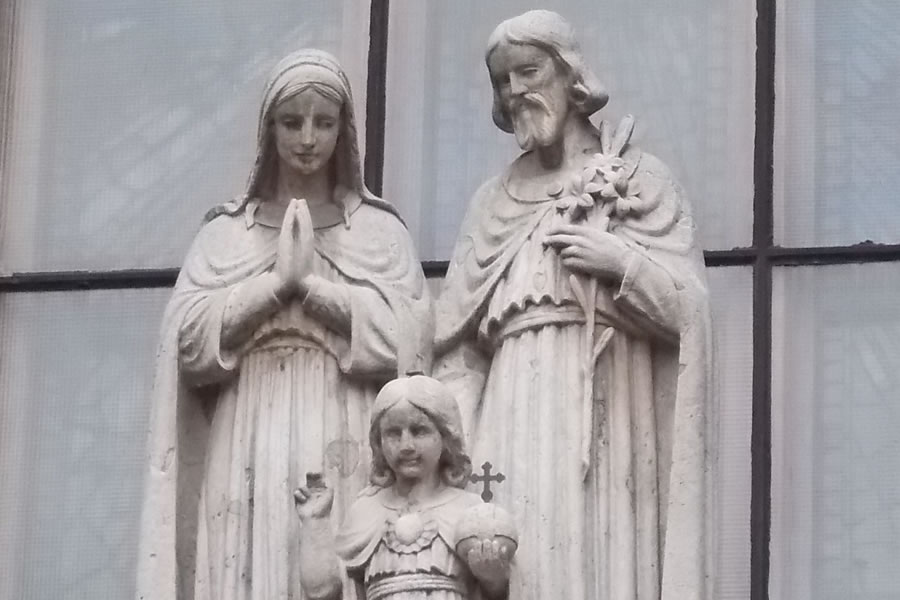St. Francis of Assisi Weekly Reflections

Jesus Mary and Joseph
12-27-2020Weekly ReflectionWe Celebrate Worship Resource, Vol. 46, No. 1The Holy Family faced challenges from the start, even before Jesus was born. When Mary was expecting, Joseph planned to divorce her quietly, assuming she had been unfaithful. With Mary about to give birth, they had to make a lengthy and difficult trip to Bethlehem, where she had to give birth in a stable. They could not return home with their baby son, but had to flee to Egypt to avoid a murderous Herod. Then when they presented him to the Lord, Simeon interrupts them and tells Mary a foreboding prophecy: “This child is destined for the fall and rise of many...a sign that will be contradicted...you yourself a sword will pierce” (Luke 2:34-35). But both Joseph and Mary had been visited by an angel of the Lord before Jesus was born, each an angel giving reassurance of God’s care and comfort. They had already endured numerous hardships and they trusted in the Lord to stay with them the entire way. Even for them, God’s presence did not mean that everything would proceed happily or easily. But it meant that they were never alone, having to face life’s challenges by themselves. Returning home, Jesus grew strong and wise “and the favor of God was upon him” (Luke 2:40). May God’s abiding presence in our families reassure us as well.
What difficulties has your family faced recently? Have your recognized the Lord’s presence?
Jesús Maria y José
La Sagrada Familia enfrentó desafíos desde el principio, incluso antes del nacimiento de Jesús. Cuando María estaba embarazada, José planeó divorciarse de ella en silencio, asumiendo que le había sido infiel. Con María a punto de dar a luz, tuvieron que hacer un largo y difícil viaje a Belén, donde tuvo que dar a luz en un establo. No pudieron regresar a casa con su hijo, sino que tuvieron que huir a Egipto para evitar al asesino Herodes. Luego, cuando lo presentan al Señor, Simeón los interrumpe y le dice a María una profecía de presagio: "Este niño ha sido puesto para ruina y resurgimiento de muchos...un signo que provocara contradicción...a ti mismo te atravesará una espada” (Lucas 2:34-35). Pero tanto José como María habían sido visitados por un ángel del Señor antes de que Jesús naciera, cada uno de ellos era un ángel que les aseguraba el cuidado y el consuelo de Dios. Ya habían soportado numerosas dificultades y confiaban en que el Señor se quedaría con ellos durante todo el camino. Incluso para ellos, la presencia de Dios no significaba que todo se desarrollaría feliz o fácilmente. Pero significaba que nunca estaban solos y tenían que afrontar solos los desafíos de la vida. Al regresar a casa, Jesús se hizo fuerte y sabio “y la gracia de Dios era sobre él” (Lucas 2:40). Que la presencia permanente de Dios en nuestras familias también nos tranquilice.
¿Qué dificultades ha enfrentado su familia recientemente? ¿Has reconocido la presencia del Señor?
—Celebramos el Recurso de Adoración, Vol. 46, No. 1

God Dwells Within Each of Us
12-20-2020Weekly ReflectionWe Celebrate Worship Resource, Vol. 46, No. 1Today's first reading turns on two meanings of the word "house" (in Hebrew, bet): first, a dwelling and second, the lineage of a notable family. King David realizes that it’s shameful that the ark of God—the most concrete sign of God’s presence—is housed in a tent while he lives in a palace. But the Lord tells David’s advisor, the prophet Nathan, that his house—his lineage, not his palace—will be blessed and endure forever. The family David builds, a line that will include Jesus Christ, is more important than the structure for the ark of the covenant. More importantly, God has been dwelling with David all along: "I have been with you wherever you went" (2 Samuel 7:9). God has chosen not to dwell in a tent or a building, but in flesh and blood, in the person of David. Centuries later, Gabriel reveals to Mary that she will carry the Son of God in her womb. From her flesh will be born the One whose kingdom will have no end. Each Christmas we are reminded that God chose a dwelling place more beautiful than a palace, more lasting than a family lineage: a home in flesh and blood, in humanity, in each of us.
How can you best provide a dwelling place for the Lord in yourself?
Dios Mora en Cada Uno de Nosotros
La primera lectura de hoy nos presenta dos significados de la palabra "casa" (en hebreo): primero, una vivienda y segundo, el linaje de una familia notable. El rey David se da cuenta de que es vergonzoso que el arca de Dios, la señal más concreta de la presencia de Dios, esté alojada en una tienda de campaña mientras él vive en un palacio. Pero el Señor le dice al consejero de David, el profeta Natán, que su casa, su linaje, no su palacio, será bendecida y perdurará para siempre. La familia que construye David, una linaje que incluirá a Jesucristo, es más importante que la estructura del arca del pacto. Más importante aún, Dios ha estado morando con David todo el tiempo: "Yo estaré contigo en todo lo que emprendas" (2 Samuel 7:9). Dios ha elegido no morar en una tienda de campaña o edificio, sino en carne y hueso, en la persona de David. Siglos más tarde, Gabriel le revela a María que llevará al Hijo de Dios en su seno. De su carne nacerá Aquel cuyo reino no tendrá fin. Cada Navidad se nos recuerda que Dios eligió una morada más hermosa que un palacio, más duradera que un linaje familiar: un hogar de carne y hueso, en la humanidad, en cada uno de nosotros.
¿Cuál es la mejor manera de proporcionar una morada para el Señor en ti mismo?
- Celebramos el Recurso de Adoración, Vol. 46, No. 1

My Soul Rejoices in My God
12-11-2020Weekly ReflectionWe Celebrate Worship Resource, Vol. 46, No. 1This is “a year of favor from the Lord” (Isaiah 61:2). No, not 2020. This century, or even this new millennium. But now and for the last two thousand years as well as for every year into the future. You see, a year of favor was a jubilee year when slaves were freed, prisoners released, and all debts were wiped out. All land and property reverted to their original owner, God, who redistributed it equitably and generously. Both people and land were liberated. Isaiah used it to describe the Chosen People’s return to Jerusalem after years in exile. Significantly, this is the passage Jesus read in the synagogue, after which he proclaimed, “Today this Scripture passage is fulfilled in your hearing” (Luke 4:21). Jesus is the fulfillment of this year of favor from the Lord. He frees us from the bondage of original sin. He wipes out all our debts. He returns us to God’s grace from the centuries of exile that began with humanity’s fall. He redeems us today and every day, opening to all of us his arms of salvation. So on this Gaudete Sunday we rejoice, for we know the Lord is come and the year of favor is here, now and forever.
What can you do to make this year of favor a reality in your life?
Se Alegra Mi Espíritu en Mi Dios
Este es “un año de gracia del Señor” (Isaías 61:2). No, no el 2020. Este siglo, o incluso este nuevo milenio. Pero ahora y durante los últimos dos mil años, así como cada año en el futuro. Verá, un año de gracia era un año de jubileo en el que los esclavos y los prisioneros eran liberados y todas las deudas quedaban borradas. Toda las tierras y la propiedades volvieron a su dueño original, Dios, quien las redistribuyó de manera equitativa y generosa. Tanto las personas como la tierra fueron liberadas. Isaías lo usó para describir el regreso del Pueblo Elegido a Jerusalén después de años en el exilio. Significativamente, este es el pasaje que Jesús leyó en la sinagoga, después de lo cual proclamó: “Hoy se cumple esta Escritura en presencia de ustedes” (Lucas 4:21). Jesús es el cumplimiento de este año de gracia del Señor. Nos libera de la esclavitud del pecado original. Él borra todas nuestras deudas. Nos devuelve a la gracia de Dios de los siglos de exilio que comenzaron con la caída de la humanidad. Él nos redime hoy y todos los días, abriéndonos a todos sus brazos de salvación. Así que en este domingo de Gaudete nos regocijamos, porque sabemos que el Señor ha venido y el año de gracia está aquí, ahora y para siempre.
¿Qué puedes hacer para que este año de gracia sea una realidad en tu vida?
—Celebramos el Recurso de Adoración, Vol. 46, No. 1

Finding God in the Midst of Struggle
12-06-2020Weekly ReflectionWe Celebrate Worship Resource, Vol. 46, No. 1“Comfort, give comfort” (Isaiah 40:1). When we look at the state of our planet, our world, our nation, and our community, we may find ourselves discouraged or even hopeless. At the time that this passage from Isaiah was written, the Chosen People certainly felt this way. They had been in exile for as long as they could recall, subjected to the laws and practices of the Babylonian Empire. Most people could not foresee deliverance. But Isaiah insisted that these years of servitude would soon be ending, that their sins had been expiated, and that the Lord would carry them out to this wasteland. Over five hundred years later, Mark uses the same words to describe the coming of “Jesus Christ the Son of God” (Mark 1:1). Two thousand years later it is all too easy to get discouraged and hopeless all over again. But we are reminded that with God, “a thousand years (is) like one day” (2 Peter 3:8). Our lifetimes are but a moment in the mind of God. The world as it exists in 2020 may be troubling, but we can still proclaim, must always proclaim, despite appearances to the contrary, “Here is your God!” (Isaiah 40:9).
When have you felt abandoned by God? How do you find God when you struggle?
Encontrando a Dios en medio de da Lucha
Consuelen, consuelen” (Isaías 40:1). Cuando miramos el estado de nuestro planeta, nuestro mundo, nuestra nación y nuestra comunidad, podemos encontrarnos desanimados o incluso desesperados. En el momento en que se escribió este pasaje de Isaías, el Pueblo Elegido ciertamente se sintió así. Habían estado en el exilio desde que tenían memoria, sujetos a las leyes y prácticas del Imperio babilónico. La mayoría de la gente no podía prever la liberación. Pero Isaías insistió en que estos años de servidumbre terminarían pronto, que sus pecados habían sido expiados y que el Señor los llevaría a este páramo. Más de quinientos años después, Marcos usa las mismas palabras para describir la venida de “Jesucristo, Hijo de Dios” (Marcos 1:1). Dos mil años después, es muy fácil volver a desanimarse y desesperarse. Pero se nos recuerda que para Dios, “un día es como mil años” (2 Pedro 3:8). Nuestras vidas son solo un momento en la mente de Dios. El mundo tal como existe en el 2020 puede ser inquietante, pero aún podemos proclamar, debemos proclamar siempre, a pesar de las apariencias en lo contrario, “¡Aquí está su Dios!” (Isaías 40:9).
¿Cuándo te has sentido abandonado por Dios? ¿Cómo encuentras a Dios en momentos difíciles?
—Celebramos el Recurso de Adoración, Vol. 46, No. 1

Be Watchful! Be Alert!
11-29-2020Weekly ReflectionWe Celebrate Worship Resource, Vol. 45, No. 3Be watchful! Be alert! You do not know when the time will come” (Mark 13:33). Indeed, we do not know when it will happen, but just last weekend we heard what will happen. Recall, the Son of Man will judge us based on what we did when our brothers (and sisters) were hungry or thirsty, naked, ill, or in prison. We probably feel relieved right now that our time has not yet come. We have another chance! Advent is our second chance. For once again we welcome Christ into the world, not just as the beatific infant lying in a manger, but in the many who go to bed hungry every night, in the homeless individuals and families with nothing but the clothes on their backs, in the forgotten residents of nursing homes, in the prisoners serving life terms, and, yes, in the millions of other babies who will be born into poverty between now and Christmas Day. May our good deeds not become like polluted rags, as Isaiah lamented. Rather, may we be as irreproachable as Paul assures the Corinthians that they will be. God has rent the heavens and come down, and not just two thousand years ago. Be watchful!
Where have you overlooked Christ in the world? What are you called to do?
¡Velen y Esten Preparados!
¡Velen y estén preparados! No saben cuándo llegará el momento” (Marcos 13:33). De hecho, no sabemos cuándo sucederá, pero el fin de semana pasado escuchamos lo que sucederá. Recuerde, el Hijo del Hombre nos juzgará basándose en lo que hicimos cuando nuestros hermanos (y hermanas) tenían hambre o sed, estaban desnudos, enfermos o en prisión. Probablemente nos sintamos aliviados en este momento porque aún no ha llegado nuestro momento. ¡Tenemos otra oportunidad! El Adviento es nuestra segunda oportunidad. Porque una vez más damos la bienvenida a Cristo en el mundo, no solo como el niño beatífico recostado en un pesebre, sino en los muchos que se acuestan con hambre cada noche, en los indigentes y familias sin nada más que la ropa que llevan puesta, en los residentes olvidados de hogares de ancianos, en los presos que cumplen cadena perpetua y, sí, en los millones de bebés que nacerán en la pobreza desde ahora hasta el día de Navidad. Que nuestras buenas obras no se conviertan en trapos contaminados, como se lamentó Isaías. Más bien, que seamos tan irreprochables como Pablo les asegura a los corintios que lo serán. Dios ha rasgado los cielos y ha descendido, y no hace solo dos mil años. ¡Estén atentos!
¿Dónde has pasado por alto a Cristo en el mundo? ¿Qué estás llamado a hacer?
—Celebramos el Recurso de Adoración, Vol. 45, No. 3

The Face of God in the Faces of Those in Need
11-22-2020Weekly ReflectionWe Celebrate Worship Resource, Vol. 45, No. 3Ezekiel introduces the metaphor of a shepherd tending a flock of sheep to describe God's care for us. At the end God judges between sheep and goats, just as in the Gospel the Son of Man separates the sheep from the goats. However, another parallel in the two readings is marked by a crucial difference. In Ezekiel, the Lord God personally looks after and cares for the sheep. But in the Gospel, we the sheep are called to care for those in need. In one sense, this adds a layer to the metaphor. But in another sense, the action is flipped. Instead of God caring for us, we are told that we need to care for others, we are actually caring for the Lord. "I was hungry and you gave mefood, I was thirsty and you gave me drink..."(Mathew 25:35). May we follow the model of the righteous so that even the least among us may be cared for, so that we may spend eternal life with him who is King of the Universe, and "so that God may be all in all" (1 Corinthians 15:28).
How can you make the efforts to see the Lord in the faces of all those in need?
El Rostro de Dios en el Rostro de los Necesitados
Ezequiel introduce la metáfora de un pastor que cuida un rebaño de ovejas para describir el cuidado de Dios por nosotros. Al final, Dios juzga entre ovejas y cabras, justo como en el Evangelio el Hijo del Hombre separa las ovejas de las cabras. Sin embargo, otro paralelo en las dos lecturas está marcado por una diferencia crucial. En Ezequiel, el Señor Dios se ocupa de y cuida personalmente a las ovejas. Pero en el Evangelio, nosotros las ovejas estamos llamadas a cuidar de los necesitados. En cierto sentido, esto agrega una capa a la metáfora. Pero en otro sentido, la acción se invierte. En lugar de que Dios se preocupe por nosotros, se nos dice que debemos cuidar a los demás, en realidad estamos cuidando el Señor. "Tuve hambre y me distes de comer, sediento y me distes de beber..." (Mateo 25:35). Que podamos seguir el modelo de los justos para que hasta el más pequeño de nosotros sea atendido, para que podamos pasar la vida eterna con aquel que es Rey del Universo, y "para que Dios sea todo en todas las cosas" (1 Corintios 15:28).
¿Cómo puedes esforzarte para ver al Señor en los rostros de los más necesitados?
Celebramos el Recurso de Adoración, Vol. 45, No. 3

All of You are Children of the Light
11-15-2020Weekly ReflectionWe Celebrate Worship Resource, Vol. 45, No. 3Today’s readings continue the heme of preparing for the end of time. In today’s parable, a man entrusts his talents to his servants, each receiving an amount according to his ability. Two of them use these talents to make more, while the third does nothing. Matthew’s readers realized that this parable was an allusion to the end of time: the master (Jesus) came back (the second coming) after a long time (it was then forty or fifty years after his resurrection) and settled accounts with the servants (the last judgment). A talent was a valuable coin worth at least one hundred denarii. A denarius was the daily wage for a laborer. So each servant, even the one with just one talent, was entrusted with a substantial sum. But only the first two are found to be good and faithful, worthy of the master’s joy. The woman is the first reading is also found to be worthy, working hard, bringing prosperity, and caring of the poor and needy. Paul assures the Thessalonians that they are worthy, “children of the light,” trusted to stay sober and alert. (1 Thessalonians 5:5)
How are you using your talents to prove your worthiness during the daylight of your life?
Todos ustedes son Hijos de la Luz
Las lecturas de hoy continúan con el tema de la preparación para el fin de los tiempos. En la parábola de hoy, un hombre confía sus talentos a sus siervos, y cada uno recibe una cantidad según su capacidad. Dos de ellos usan estos talentos para hacer más, mientras que el tercero no hace nada. Los lectores de Mateo se dieron cuenta de que esta parábola era una alusión al fin de los tiempos: el maestro (Jesús) regresó (la segunda venida) después de mucho tiempo (cuarenta o cincuenta años después de su resurrección) y ajustó cuentas con los sirvientes (el juicio final). Un talento era una moneda valiosa que valía al menos cien denarios. Un denario era el salario diario de un trabajador. Así que a cada siervo, incluso al que tenía un solo talento, se le confió una suma sustancial. Pero solo los primeros dos son buenos y fieles, dignos de la alegría del maestro. La mujer en la primera lectura también es digna, trabajadora, trae prosperidad y se preocupa por los pobres y los necesitados. Pablo les asegura a los tesalonicenses que son dignos, “hijos de la luz”, en quienes se confía para permanecer sobrios y alertas. (1 Tesalonicenses 5:5)
¿Cómo estas usando tus talentos para demostrar tu dignidad durante los días de tu vida?
—Celebramos el Recurso de Adoración, Vol. 45, No. 3

The Wise Brought Flasks of Oil with their Lamps
11-08-2020Weekly ReflectionWe Celebrate Worship Resource, Vol. 45, No. 3Today's scriptures begin a series of readings that focus on the end of time. Jesus says to his friends that they will "know neither the day nor the hour" (Matthew 25:13). They (and we) cannot wait around unprepared, assuming there will be more time later; we must always be prepared. How do we prepare? In Jesus' parable, five of the young women prepared by bringing plenty of oil, for their job was to greet the bridegroom late at night and guide him through the dark to the wedding feast. This is their sole responsibility. This is what they had been asked to do. What are we asked to do? We will learn more over the next two Sundays, but for now we are exhorted to value wisdom. Search for wisdom, we hear in the first reading, and we will find it. Then we can use it like the women who planned ahead. We are now in the dark as to when the end will come, both the world's and our own. But because we believe that Jesus conquered death and rose to new life, we have the hope that when we die, we will be brought with him to the father. As Paul writes to the Thessalonians, this hope gives us consolation.
What does the wisdom you've found tell you to do to prepare for eternal life?
Las Sabias Trajeron Un Frasco De Aceite Con Su Lámpara
Las escrituras de hoy comienzan una serie de lecturas que se enfocan en el fin de los tiempos. Jesús les dice a sus amigos que “no sabrán ni el día ni la hora” (Mateo 25:13). Ellos (y nosotros) no podemos esperar sin estar preparados, asumiendo que habrá más tiempo después; siempre debemos estar preparados. ¿Cómo nos preparamos? En la parábola de Jesús, cinco de las jóvenes se prepararon trayendo abundante aceite, porque su trabajo era esperar al esposo a altas horas de la noche y guiarlo a través de la oscuridad hasta la fiesta de bodas. Ésta era su única responsabilidad. Esto es lo que se les pidió que hicieran. ¿Qué se nos pide que hagamos? Aprenderemos más durante los próximos dos domingos, pero por ahora se nos exhorta a valorar la sabiduría. Busquen la sabiduría, la escuchamos en la primera lectura, y la encontraremos. Después podemos usarla como las mujeres que planearon con anticipación. Ahora no sabemos cuándo llegará el fin, tanto del mundo como del nuestro. Pero debido a que creemos que Jesús conquistó la muerte y resucitó a una nueva vida, tenemos la esperanza de que cuando muramos seremos llevados con él al padre. Como Pablo escribe a los tesalonicenses, esta esperanza nos da consuelo.
¿Cómo te guía la sabiduría que has encontrado para prepararte para la vida eterna?
—Celebramos el Recurso de Adoración, Vol. 45, No. 3